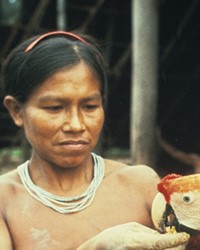Makuna, Jepa-Matsi in Colombia

Photo Source:
Anonymous
|
Send Joshua Project a map of this people group.
|
| People Name: | Makuna, Jepa-Matsi |
| Country: | Colombia |
| 10/40 Window: | No |
| Population: | 1,900 |
| World Population: | 1,920 |
| Primary Language: | Macuna |
| Primary Religion: | Christianity |
| Christian Adherents: | 70.00 % |
| Evangelicals: | 5.00 % |
| Scripture: | New Testament |
| Ministry Resources: | Yes |
| Jesus Film: | No |
| Audio Recordings: | Yes |
| People Cluster: | South American Indigenous |
| Affinity Bloc: | Latin-Caribbean Americans |
| Progress Level: |
|
Introduction / History
The Jepa-Matsi Makuna, also known as the Macuna or Yehpá-Majsá, are an indigenous people of the Colombian Amazon, primarily residing in the Vaupés department, along the Apaporis, Mirití-Paraná, and Pira-Paraná rivers. Their language, Macuna, belongs to the Eastern Tucanoan language family.
Historically, the Makuna were semi-nomadic, living in malocas (communal longhouses) and practicing swidden agriculture, hunting, and fishing. Their first contact with outsiders came during the rubber boom in the late 19th century, which led to forced labor and exploitation. Later, the coca trade and gold mining further disrupted their traditional way of life.
What Are Their Lives Like?
The Makuna live in small villages, often consisting of 10–70 people, and maintain a subsistence lifestyle based on manioc cultivation, hunting, fishing, and gathering forest products. Their diet includes plantains, sweet potatoes, bananas, pineapples, and sugarcane, as well as game such as tapirs, peccaries, and pacas.
Social organization is based on clans and patrilineal descent, with shamans and chiefs playing central roles in community leadership. Intermarriage among clans strengthens social bonds, and reciprocity is a key cultural value.
Despite external pressures, Makunas continue to manage their environment sustainably, viewing nature as sacred and interconnected with their spiritual beliefs.
What Are Their Beliefs?
The Makuna practice a complex animistic belief system, often described as ecosophy, which sees humans as part of a sacred ecological balance. Their shamans mediate between the human and spiritual realms, using hallucinogenic plants, rituals, and sacred words to maintain harmony and healing.
They believe that natural elements, such as rivers, hills, and animals, are inhabited by spirits. In their cosmology, the world undergoes cycles of destruction and renewal, and specific sacred sites are believed to be held up by ancestral spirits. The removal of gold from sacred hills is seen as a threat to their spiritual vision and cosmic balance.
While three-fourths identify as Christian, only a small percentage are Evangelical, and many blend Christian teachings with traditional beliefs.
What Are Their Needs?
Spiritual discipleship and biblical teaching are needed to help Makuna Christians grow in their faith and understand Scripture in culturally relevant ways.
Protection of ancestral lands and sacred sites is vital. Gold mining and deforestation threaten both their environment and spiritual worldview.
Preservation of the Macuna language and oral traditions is essential. Language loss would undermine cultural identity and the transmission of ancestral knowledge.
Prayer Points
Pray for spiritual renewal among Makuna Christians, that their faith may be rooted in biblical truth and not diluted by syncretism.
Ask God to raise up indigenous leaders and missionaries who will disciple others in culturally sensitive ways.
Pray for many Makunas to become Christ's ambassadors to gospel neglected people.
Pray for God to provide for all their spiritual and physical needs in such a way they will give him praise.